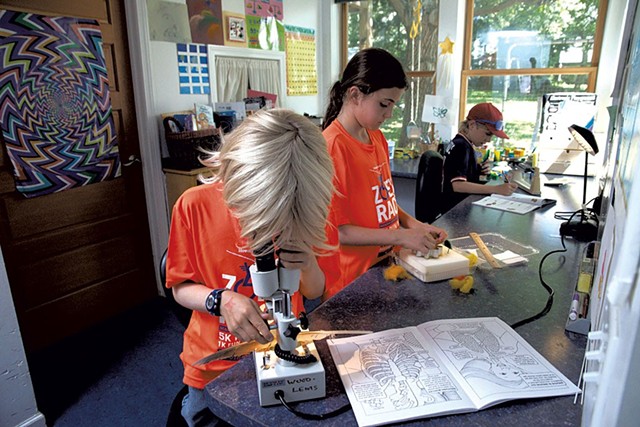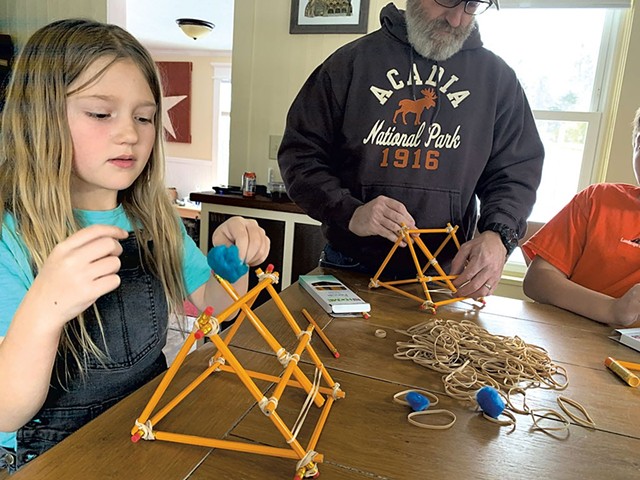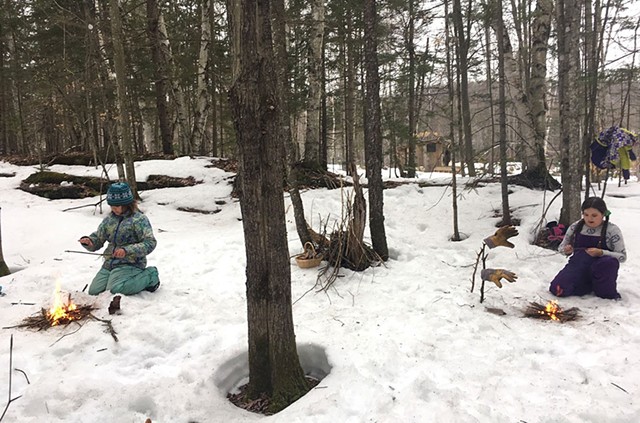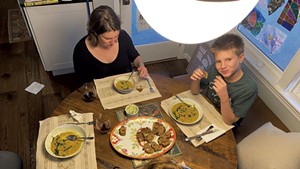
- Matthew Thorsen
- The Wood-Lewis family in their homeschooling alcove in 2014
The end of the school year as we've always known it arrived abruptly on March 26: That's when Gov. Phil Scott closed all Vermont schools to slow the spread of COVID-19. Suddenly parents and caregivers faced the prospect of keeping kids engaged in learning while also working from home, caring for relatives, managing a household, filing for unemployment or reporting to an essential job site.
This unprecedented turn of events prompted a collective "Now what?!"
Educators around the state have been scrambling to help answer that question. In a voicemail to Champlain Valley Union High School staff, students and parents, principal Adam Bunting assured parents that "this is not goodbye and that this year is not over. We will stay in contact. We will continue to learn together as a community."
Under Scott's declaration, schools must implement a remote learning plan. Many districts have already begun online instruction — from conducting morning meetings via Google Hangouts to posting assignments online to offering menus of activities. But there will likely be large swaths of time when it falls to parents and caregivers to make sure their kids are learning.
To help with that, we've asked Vermont parents who homeschool by choice to share some of their insights and tips. Here's a pearl of wisdom from Burlington mom Erica Spater to kick things off: "Remember, hindsight is going to smooth out the rough edges of this crazy homeschooling experience. You'll see the 'magic' in it from the rearview mirror. Right now, those grumpy, obstinate children of yours are exactly as close as they appear."
Valerie Wood-Lewis
Burlington, licensed teacher, homeschool assessor for the state. Kids' ages: 13, 16 and 16
Try to enjoy your kids — they are growing up fast, and you will look back and see the opportunity to have spent time with them as a gift.
Institute a daily family outside outing. We have to resort to dragging the teens along for "forced family fun" sometimes, but they never regret it. Walk the dog, toss a Frisbee, get down to see the lake, get in even a tiny patch of woods. Such perspective!
Create the expectation of a daily "quiet time" (ideally screen-free). This is a time everyone is in their own room (or when my kids were little, a different room from one another) for an hour or more. They can listen to audiobooks, do Legos, read, nap, organize their closets, do art, whatever. It gives everyone a social break from the larger family and guarantees a time for that important call or quick meditation/yoga/reading/nap, etc. for the adult.
Make an attempt to "lighten up" on whatever your normal triggers are — kids being messy, loud, on screens, etc. This is going to be a long haul, and patience and flexibility are going to be key.
Don't worry about how much gets covered academically. Really. If kids are not going down the rabbit hole on screens, they will have time to learn organically: from family conversations, researching interests, reading, building things, making music and art, cooking, reading the newspaper, getting in shape, etc. Kids are evolutionarily designed to learn.
Cindy Gordon
Woodbury. Kids' ages: 2, 6 and 9
For the many families now mandated to school at home, I would suggest setting a very loose daily schedule just to keep the days predictable, the children stimulated and the chaos/boredom within your control.
Many times, my children choose which topic we learn about. I go and find interesting books, activities, games, art, food, etc. about that topic, and the children love it. If you have older children, they can easily choose a topic and google some interesting activities while needing minimal parental support. If you do a little looking around, you will find an abundance of ideas online. There are many educational sites and homeschooling blogs that have entire unit studies on various topics all ready to go for you.
Make a list, loosely plan each day ahead of time, and you may find confidence replacing your uncertainty about your child's daily routine.
Heather Duhamel
St. Albans, educational consultant (retrainvt.com). Kids' ages: 9 and 12

- Courtesy of Heather Duhamel
- Heather Duhamel's family builds a catapult
Each day is a new start, so define how it will go together. Write down goals or shout them out!
Be ready to sneak in learning as you move through your days. You do not need to name the lesson to have the learning count.
Working and schooling from home is the art of orchestrated chaos. Embrace ideas, feelings and mess as learning opportunities show themselves. Be willing to stop and restart. This models responsiveness and resilience — essential skills to develop in these times.
Build in time to make a hundred snacks.
Advice from Heather's family:
Cicely, age 9: Find things that you have in common as a family. This builds on your relationships when you have to do the hard stuff. Make sure to come back together and laugh.
Eli, age 12: Some projects take a really long time — like, days. Some can only take five minutes. Until you start and make a plan, it is hard to know how it will go. Be flexible with your kids so they have time to learn the way that feels best.
Andrew, homeschool dad: Schooling at home is still home first, with school and learning goals built in. This remains true for us, too, and we are in our fourth year as a home-study family.
Erica Spater
Burlington. Kids' ages: 9 and 13
It's not easy and it's not for everyone, so please don't beat yourself up about it.
In the end, you will not have the chance to pat yourself on the back and congratulate yourself on how you nailed it and educated the hell out of your kids. What you will gain is a really cool opportunity to understand how your kids think. They'll show you in the most offensive and confrontational ways as you struggle to complete the worksheets and virtual tours and virtual yoga sessions and super-cool-messy-time-and-material-heavy science experiments.
You don't have to overachieve at this like you do at your job, and the first people to remind you are going to be your kids. If you can get curious in those frustrating moments, you'll learn some really valuable information about what goes on in their hearts and minds. That understanding is what you'll be able to take away from this weird and wacky time: a precious and portable knowing that will serve you and your kids better than a completed packet of worksheets.
Michelle McGee
Hinesburg, leader of Greater Chittenden County Home Study group. Kid's age: 10
A lot of learning can happen in a little bit of time, so don't feel you need to fill every minute of the day with formal instruction, or you'll exhaust everyone. Also, kids give cues when they are not able to focus intently, so it's better to follow the cues and let the more scholarly work happen in little gems of time.
There are so many opportunities for kids to learn through ordinary needs. Cooking is great for both math and science learning. There's also carpentry, sewing/mending and tidying/cleaning. For instance, with cleaning, my 10-year-old thought of making her own solutions for cleaning. With mending, she got interested in making her own stuffed animal, which she had to design. Both fixing things and taking broken things apart can be fun and satisfying.
Christine Vatovec
Burlington. Kid's age: 9
Our main thought is to be kind and appreciative of one another as learners. Allow yourselves time to become a learning team — what are the things that you love to do, and how can you offer a love for learning through your own passion? What are the things that your child loves to do, and how can you build upon that innate passion to deliver "required" content? If your child loves rockets, write a story about rockets together, calculate the distance to the moon together, use the free online resources through the library system to read a book about rockets together, paint a picture of rockets, etc.
Play games to help your student gain comfort and fluency with math facts (Yahtzee, anyone?) and language (Scrabble? Mad Libs?). Act out great moments in history. We recently hosted a "colonial dinner" night complete with homemade costumes, music courtesy of a quick YouTube search, and a menu fitting for the time period — and it was a blast! Go outside, every day, and learn natural sciences from the world around us. Chart the temperature over the course of the day, identify the birds that fly through your backyard by sight and sound, keep a journal of which plants awaken first, and think like a scientist by simply asking, "Why?"
Renee Circosta
Greensboro. Kids' ages: 12 and 14
Balance and variety are key in setting up a good lesson and maintaining enthusiasm for learning and homeschooling. Regardless of the subject, try to get at it from a lot of different angles. Find a good balance of books versus online sources, typing versus writing, talking versus listening, videos versus reading, drawing versus data analysis, hands-on projects versus thought exercises, quick tasks versus long-term projects. Having a wide range of options means that students can almost always find something useful to do, even if they are tired or sick of reading, or whatever the case may be.
If you have a choice, teach what you know. Share your passions with your children. Teach them about your job or hobby, or read and discuss a favorite book.
Don't panic if your older student wants to learn physics or linear algebra or the details of Renaissance fashions, and you know next to nothing about it. There are so many incredible books, online sources, mentors and online classes that can help you navigate new terrain. We often turn to the Great Courses to help us structure our lessons around an unfamiliar topic.
And don't underestimate the value of a good book. Books provide clarity and calm in the face of often overwhelming amounts of online information.
Tie your lessons to real-life issues. The current events surrounding the coronavirus are a great example. You could look at everything from how soap destroys a virus to interpreting political cartoons, from media literacy to the role of the Federal Reserve, from the legislative process to the history of epidemics and plagues, from data collection and spreadsheets to medical ethics and social action. When you tie your lessons to the real world, you avoid a lot of the "Why do I have to learn this?" type of complaints.
Katie Lane-Karnas
Calais, licensed teacher, homeschool assessor for the state. Kids' ages: 10 and 8

- Courtesy of Katie Lane-Karnas
- Katie Lane-Karnas' children practicing their fire-making technique
If you are feeling overwhelmed, worried, strained and angry, acknowledge this as best you are able to yourself, and give yourself permission to be gentle with yourself. For a long time. For really a lot longer than you have given yourself permission to be gentle with yourself before.
Look at your people and acknowledge that there is nothing natural about being isolated from community, but the way you show up with them is showing them something about what it means to be in an intimate relationship. We can become more awake, listen a bit more deeply, feel a little more fully, rest a whole lot more, and come back to the table with the intention to do less harm and nurture relationships. In homeschool lingo, this process is referred to as "deschooling," a process of healing from others' ownership over your time and agency. I offer this term because (in addition to being googleable) it inserts language to name a messy process of big feelings, somehow making it more real.
Stepping outside of school, and beginning to decouple "education" from "schooling," is safe and OK to experience, name and get support for, even if you fully plan to step back into schools in the future. That work and healing is valuable and creates space for new possibilities to emerge for kids, parents and teachers — in your own home, in your community, in your heart.
And also, the kids will learn lots of things.
Keep yourself rested and fed, virtually hooked up with an inspiring friend or two, and keep coming back to chats with your kids. Watch shows together, play a game, go outside. Do the things that don't engage the teacher-student struggle. Learning happens in leaps and bounds when people have agency over their time and are feeling happy in their relationships.
Rebecca Yahm
Plainfield, homeschooling consultant at openpathhomeschooling.com. Kid's age: 13
This is a stressful and confusing time for parents and kids alike. Many parents are working full time from home, as well as trying to guide their children's education. Homeschooling usually involves lots of time out in the community and interacting with other people. Even under the best of circumstances, it takes new homeschoolers time to adjust and figure out what works for them. This is not the time for elaborate schedules or curriculum plans. This is a time to focus on your child's — and your whole family's — emotional and physical health. If you can, spend extra family time together doing things you all enjoy. Focus on getting plenty of sleep, eating healthy foods, getting exercise and fresh air, and reducing stress.
This is a great opportunity for unstructured, self-directed learning. Encourage activities like reading for pleasure, games, crafts, block/Lego building, outdoor activities, playing music, family dance parties, reading aloud, watching documentaries, writing stories, cooking and baking, making art, etc.
Help your kids and teens find ways to stay connected with friends and extended family from a distance.
Older kids and teens in particular might want to use some of this free time to launch into a bigger project (like writing a novel, planting a garden or learning computer programming). Give them the time and space to do that, and support their endeavor with your interest and attention, as well as the materials they need. If your child's school is sending work home or you want to do other structured academics, talk with your kids/teens about how to make sure that stuff gets done, but try to keep it low-key. You might want a loose structure or schedule, but stay flexible. Most of all, be kind to yourselves and each other during this difficult time.
Sa Budnitz
Burlington, educational and parenting consultant. Kid's age: 11
You already know your children best, and you will find a way.
It becomes easier, as your family finds its own rhythm.
Focus on connecting with your children, before you start educating them.
You don't have to do it all by yourself. Have the courage to ask for help.
Here are some good resources:
(Budnitz is offering free consultations during this time. Find more at sabudnitz.com.)
Lila Hamel
Waterbury. Kids' ages: 12 and 15
Each one of us has a time of day when we're at our best. It's our prime time for getting things done. We hear some individuals referred to as "morning people" and others as "night owls." Figuring out what hours of the day our children are at their best will help us engage their minds and interest, and lessen frustrations. Yes, it can interfere with our own rhythms. Understanding each person's needs can help us adapt to what will work best for our family.
Subjects can work better at certain times of the day. In our family, English/language arts/writing are better done in the morning, and math right after lunch and a good break. We also often do science and history in the evening. We try not to be on screens until late in the morning, too.
Having breaks every two to three subjects is a great way for our children to also do other educational things, like exploring personal interests and getting outside. Many things contribute to our whole person. Our kids are no different.











Comments
Showing 1-1 of 1
Comments are closed.
From 2014-2020, Seven Days allowed readers to comment on all stories posted on our website. While we've appreciated the suggestions and insights, right now Seven Days is prioritizing our core mission — producing high-quality, responsible local journalism — over moderating online debates between readers.
To criticize, correct or praise our reporting, please send us a letter to the editor or send us a tip. We’ll check it out and report the results.
Online comments may return when we have better tech tools for managing them. Thanks for reading.